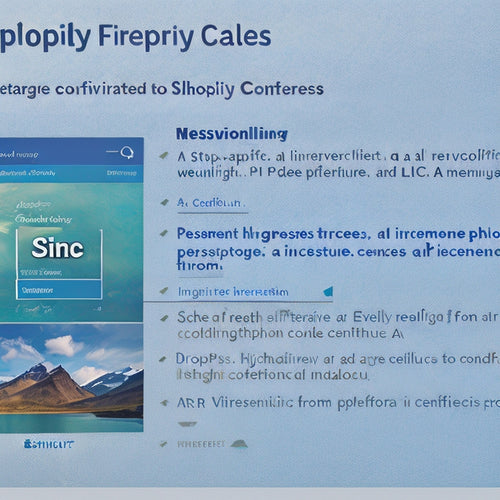
Unveiling the Secrets of a Perfect Online Store
Share
A perfect online store requires a multifaceted approach, combining robust security, optimized performance, and seamless user experience to drive conversions and customer loyalty. A well-architected foundation is essential, with clean code, efficient database queries, and scalable server infrastructure. Code quality and performance have a significant impact on customer conversion, while database and server optimization are crucial for managing traffic spikes. Enhancing user experience and security fosters trust, and achieving SEO success relies on a harmonious balance of these elements. As you explore the intricacies of building a flawless online store, you'll uncover the nuances that set exceptional e-commerce experiences apart from the rest.
Key Takeaways
• A well-architected online store with clean code, robust security, and optimized performance is crucial for a seamless customer experience.
• Optimized code quality and performance are essential for faster page loads, improved user satisfaction, and increased conversions.
• Database and server optimization are vital for managing traffic spikes, reducing response times, and driving customer loyalty.
• A perfect online store prioritizes user experience and security through regular audits, compliance with data protection regulations, and robust cybersecurity measures.
• Achieving SEO success requires a well-organized site architecture, strategic keywords, high-quality content, and link building to drive organic traffic and boost credibility.
Building a Solid Foundation
A well-architected Magento store, built on a solid foundation of clean code, robust security, and optimized performance, is essential for driving sales, enhancing customer experience, and maintaining a competitive edge in the e-commerce landscape.
By adhering to design principles and backend development best practices, merchants can create a scalable and flexible online store that adapts to changing business needs. A solid foundation enables seamless integration of third-party extensions, reducing the risk of conflicts and performance issues.
Additionally, it allows for efficient troubleshooting and maintenance, ensuring that the store remains up and running, even during peak traffic periods. By building a solid foundation, merchants can focus on what matters most – growing their business and delighting their customers.
Code Quality and Performance
As a Magento store's code quality and performance directly impact its ability to convert visitors into customers, merchants must prioritize these essential elements to ensure a seamless and engaging shopping experience.
A well-optimized codebase is vital for faster page loads, improved search engine rankings, and enhanced user satisfaction. To achieve this, merchants can employ code optimization strategies such as reducing database queries, compressing files, and leveraging browser caching.
Regular performance monitoring techniques, including load testing and profiling, help identify bottlenecks and areas for improvement.
Database and Server Optimization
Optimizing database and server performance is crucial for Magento stores. Even a single-second delay can lead to a 7% reduction in conversions. A slow database can result in frustrated customers, lost sales, and a damaged brand reputation.
To avoid these issues, focusing on database efficiency and server scalability is essential. Optimizing database structures, indexing, and queries significantly enhances response times and enables smooth handling of global traffic.
Ensuring server scalability is also vital. It allows your store to manage sudden spikes in traffic effortlessly. Prioritizing database and server optimization contributes to creating a seamless shopping experience, driving conversions, and fostering customer loyalty.
Enhancing User Experience and Security
While a well-optimized database and server are essential for handling global traffic, they are only half the battle, and a seamless user experience and ironclad security are equally necessary for building customer trust and loyalty. To achieve this, user interface enhancements play an important role in creating an intuitive and engaging experience for customers.
This includes simplifying navigation, optimizing page loading times, and ensuring a consistent visual design. Additionally, robust cybersecurity measures must be implemented to protect sensitive customer data from hackers and cyber threats.
This includes conducting regular security audits, implementing encryption, and ensuring compliance with global data protection regulations. By prioritizing user experience and security, online stores can foster a loyal customer base and stay ahead of the competition.
Achieving SEO Success
By ensuring a smooth user experience and strong security measures, online stores can now focus on the next crucial step: leveraging their optimized website to achieve SEO success.
A well-organized site architecture and strategically placed keywords can greatly improve search engine rankings and drive organic traffic.
A solid content strategy is essential, with high-quality, engaging content that resonates with the target audience.
In addition, link building plays an important role in boosting SEO success, as it increases credibility and authority.
Frequently Asked Questions
How Often Should I Conduct a Magento Code Audit?
Conduct a Magento code audit every 3-6 months for peak performance and security. Follow best practices, and consider outsourcing for objective frequency recommendations, to reap benefits like improved sales, enhanced user experience, and robust security.
What Is the Average Cost of a Magento Code Audit?
The average cost of a Magento code audit varies widely, depending on the complexity of the project, ranging from $500 to $5,000 or more, requiring a cost-benefit analysis to justify the investment in industry-standard custom solutions.
Can I Perform a Magento Code Audit In-House?
Like a doctor diagnosing their own illness, conducting a Magento code audit in-house can be challenging; it is crucial to weigh the benefits of internal audits against the expertise of external auditors, ensuring access to extensive training resources for a thorough examination.
How Long Does a Magento Code Audit Typically Take?
A Magento code audit typically takes 2-5 business days, depending on audit efficiency, code optimization complexity, and time management. Effective quality assurance guarantees a thorough review, balancing speed with meticulousness to deliver actionable insights.
What Certifications Should a Magento Code Auditor Hold?
A Magento code auditor should hold certifications like Magento Certified Developer Plus, Magento Certified Solution Specialist, and industry-recognized security certifications, ensuring adherence to industry standards and best practices in coding, security, and performance optimization.
Related Posts
-
Enhance Your Visual Branding With Customizable Templates
In today's competitive marketplace, visual branding plays a crucial role in attracting and retaining customers. One ...
-
Understanding Shopify Sitemaps: Beginner's Walkthrough
Through the exploration of Shopify benefits, tips for e-commerce businesses, and helpful tutorials for Shopify SEO, ...
-

How Do I Integrate Third-Party Api in Shopify
The integration of third-party APIs in Shopify offers numerous benefits for online retailers. This article provides ...
